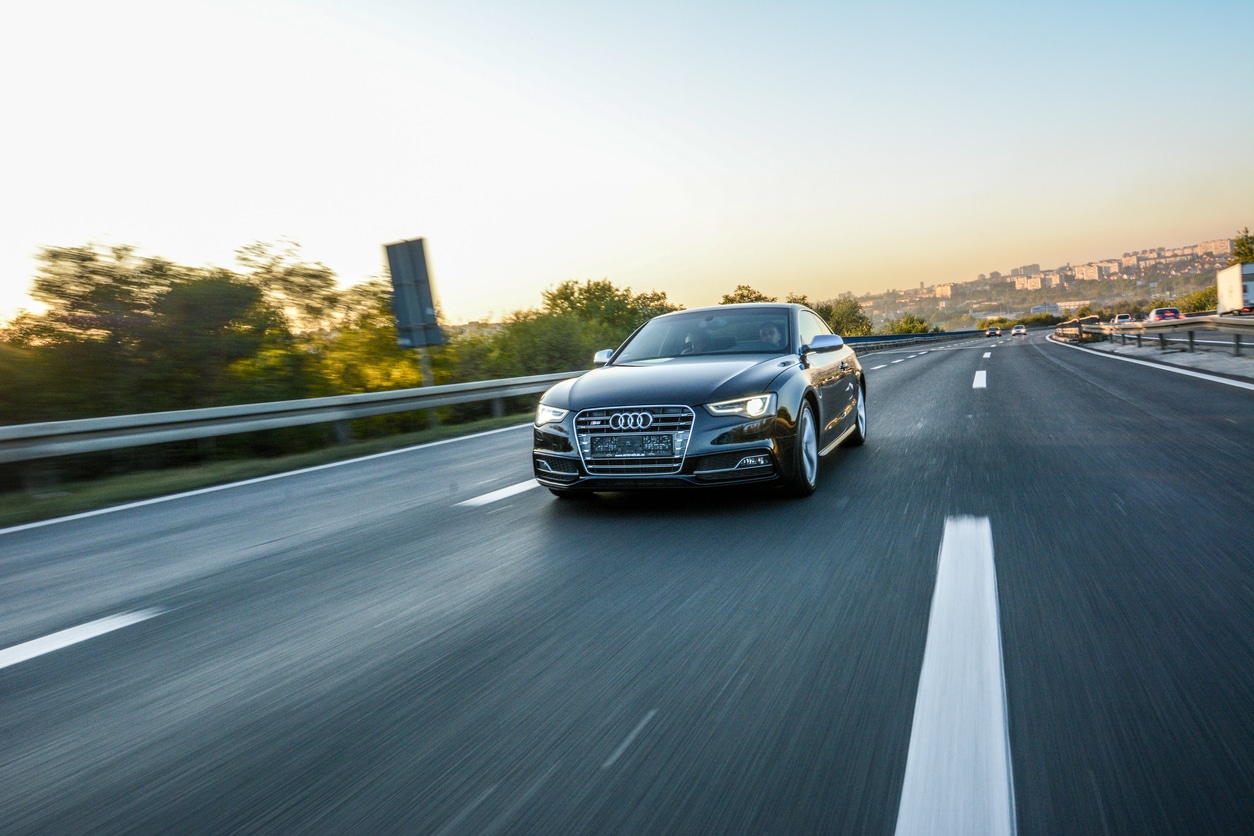Racing on a public highway is a serious traffic offense in New Jersey and carries severe penalties. The state has two statutes that outlaw participating in illegal speed contests. Both define the offense the same way, but one is broader and includes more than just those who drive the cars.
What Are the Penalties for Racing in New Jersey?
Fine: A first offense for racing on a highway in New Jersey costs between $25 and $100. A second and subsequent offense costs between $100 and $200.
Points: Each conviction for racing on a highway in New Jersey results in 5 points on one’s driver’s license. In NJ, it takes 6 points for a person to be hit with a surcharge (see below) and 12 points to lose one’s license.
Court Costs: A person who takes his/her racing ticket to court will have to pay an additional $33, on top of any fines or surcharges he/she may face.
Surcharge: When a driver accrues 6 points or more on his/her license, it obligates them to pay an additional surcharge. This costs $150 plus an additional $25 for each point over six. The NJ surcharge is billed annually for three years.
Auto insurance increase: Racing on a highway is unsafe behavior that carries a high risk of an accident. According to Money.com, insurers raise rates an average of 73.3% in response to a conviction for racing on a highway.
Jail time: A first conviction for racing in NJ does not carry a risk of jail time. However, a second or subsequent conviction can result in up to 90 days in jail at the judge’s request.
What Does NJ Consider Racing?
Both of New Jersey’s laws concerning racing are worded similarly. NJSA 39:4-52 simply states that “No person shall operate a motor vehicle upon a public highway for a wager or in a race or for the purpose of making a speed record.”
In addition, NJSA 39:5C-1 states, “A person who shall operate or attempt or agree to operate a motor vehicle on a public highway in a race with any other motor vehicle or for the purpose of making a speed record or who shall arrange for, manage, encourage, or assist in, the holding of, or the attempting to hold, any such race or speed race event, is a disorderly person…”
State v. O’Connor establishes that police may infer that two or more vehicles are racing based on both speed and formation, among other factors. The case further notes that police need not observe evidence of a starting or finishing point, a timer or a starter, nor anything that indicates the cars changed relative positions during the alleged race.
Can I be Charged with Racing if I’m not a Driver?
Under 39:5C-1, a person does not necessarily have to be operating a vehicle to be charged. A person who organizes a race or encourages others to participate in a speed contest can be charged with this offense and face all the same penalties as the drivers.
Do I Have to Be Speeding to be Charged with Racing on a Highway in NJ?
Not necessarily. Provided that a person is operating a vehicle in a speed-related contest, a person can be charged with racing under either statute. A driver need not be exceeding the legal speed limit at the time of the traffic stop.

Can I Lose My License for Racing on a Highway in New Jersey?
It is possible for a judge to revoke a driver’s license for participating in a race on a public highway in NJ. Under 39:5-31, a judge may strip driving privileges of any person he/she deems to be guilty of a “willful violation” of the law. In other words, if the driver knew what he/she was doing was illegal, it may be grounds for a license revocation.
Defenses to Racing in New Jersey
A charge of racing on a highway in NJ breaks down to two core components
- The vehicle(s) were involved in a speed-related competition.
- The competition took place on a public roadway.
Disproving either of these two factors can be key to beating a racing ticket. State v. O’Connor sets a low bar for prosecutors to prove that a vehicle’s actions were part of a speed contest. For example, the vehicles in O’Connor were not jockeying for the lead position—they maintained a specific formation at a constant speed—and yet the judge ruled that the actions of the drivers constituted a race.
The defendants in O’Connor were able to beat the charge by disproving that the roadway in question was not a public highway. This was a unique instance as they were driving on a stretch of Route 287 that at the time was not yet completed and open to the public. “The court is of the opinion that as Route 287 at the point of the racing was entirely closed to travel, it was not a public highway.”
Unless the driver is operating on a roadway not open to the public or can otherwise explain why his/her actions were not racing, the next best bet may be to negotiate with prosecutors to reduce the charge to a lesser offense (also called a plea bargain). A ticket for racing on a public highway can often be reduced to careless driving or unsafe driving. It may also be possible to reduce racing to a simple speeding ticket (assuming the driver was not also issued a speeding ticket).
Why Hire an Attorney to Defend a Ticket for Racing in New Jersey?
The best strategy for beating a racing ticket in New Jersey depends on the circumstances of the case. The average person may not know what tactics will provide the best chance for a positive outcome, but a skilled attorney will. By hiring an attorney, a person can be assured that he/she will have an experienced professional who can analyze the facts and develop a defense most likely to mitigate or eliminate the consequences.
Moreover, having an attorney means a person will have someone in their corner with knowledge and experience facing judges and prosecutors. Testifying before a judge can be intimidating, and even an honest and innocent person can accidentally incriminate themselves by saying the wrong thing at the wrong time. An attorney can handle as much of the talking as possible, while also coaching a client on when and how to present certain facts.
Common Questions About Racing in New Jersey
- Is racing on a highway in NJ considered reckless driving?
Not necessarily but, depending on the circumstances, participating in an illegal race can also be considered reckless driving and thus a person can be ticketed for both offenses.
- How fast does one have to be going to be considered racing in NJ?
Exceeding the speed limit is not required for a driver to be charged with racing on a public highway in New Jersey. In fact, it’s possible for someone to be ticketed for both racing and speeding, as they are technically two separate offenses.
Who Should I Contact About My Ticket for Racing on a Highway in NJ?
If you or a loved one has been cited for racing on a public highway or any other serious traffic offense in New Jersey, you need the help of a skilled attorney. The lawyers at Rosenblum Law are skilled traffic ticket attorneys with experience helping people navigate NJ’s legal system and avoid the most serious consequences. Email Rosenblum Law or Call 888-815-3649 today for a free consultation about your case.


